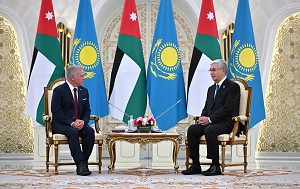Higher education: Jordan's path to global competitiveness - By Hasan Dajah, The Jordan Times
Jordan currently faces several complex challenges that cast a shadow over various aspects of economic, social, and political life. However, the most prominent challenge is the high unemployment rate among young people, especially university graduates. The local market has become saturated with many specialists in traditional fields that are not compatible with the requirements of the new economy based on technology and innovation. This has created a wide gap between higher education outcomes and labor market needs. Given that Jordan lacks natural resources and relies primarily on its human resources, developing the higher education sector is the most important strategic option to address these dilemmas.
The past decades have produced clear imbalances in the structure of higher education. Universities have focused on graduating large numbers of students in disciplines such as management, social sciences, and law, while attention has remained limited to future disciplines leading the world today, such as artificial intelligence, cybersecurity, renewable energy, financial technology, and life sciences.
This trend has forced thousands of graduates to seek traditional jobs that the local market is no longer capable of absorbing. This has exacerbated unemployment rates, particularly among the younger demographic, where unemployment has exceeded 40 per cent at times. In addition to this problem, poor proficiency in foreign languages, particularly English, stands out as a barrier to Jordanian graduates seeking to integrate into regional and international labor markets. Furthermore, limited proficiency in technical and communication skills undermines competitiveness at the global and regional levels, while universities remain constrained by accumulated financial crises that limit their ability to update their curricula or invest in scientific research.
These challenges compel Jordan to seriously consider redefining the role of universities, so that their mission is not merely to grant degrees, but rather to prepare a generation capable of interacting with the global economy and keeping pace with technological transformations.
Internationalising higher education represents a key approach to achieving this goal, through enhancing teaching in foreign languages, particularly English, and opening channels for academic cooperation with prestigious universities around the world. This provides Jordanian students with the opportunity to gain exposure to more diverse educational experiences and prepares them to compete beyond their borders.
The development of future specialisations has become a national necessity. The world is rapidly moving toward a revolution in future specialisations, and the labor market is increasingly demanding fields such as big data analytics, renewable energy engineering, biotechnology, and information security.
Investing in these programs will enable Jordanian universities to produce globally in-demand talent, rather than continuing to produce traditional, saturated specialisations that only create more unemployment. Furthermore, it is essential to focus on developing students' skills in critical thinking, innovation, teamwork, and communication—the so-called soft skills that are essential for any graduate's success in the international labor market.
It is also important for Jordanian universities to expand their partnerships with the local and global private sector, providing practical training opportunities for students and directly linking education to the labor market. Students need to experience a real-world work environment before graduation, so they do not remain trapped in inapplicable theoretical knowledge.
Encouraging entrepreneurship and innovation by establishing specialised centers and business incubators within universities can help transform students from job seekers to job creators, relieving pressure on the local labor market and strengthening the national economy. Furthermore, restructuring university admission policies is an indispensable step. Admissions to saturated majors must be reduced, and students must be directed toward fields needed by the national, regional, and global economy. Integrating technology into the educational process through blended and e-learning allows students access to global knowledge sources and provides them with opportunities to learn from leading universities and research institutions without geographical restrictions.
Applied scientific research remains a key focus of any reform process, as efforts should be directed toward research that meets societal needs and opens horizons for international cooperation, thus contributing to enhancing the global reputation of Jordanian universities.
Transitioning from the model of graduates seeking limited local employment to graduates capable of competing in the international market requires clear political will and a comprehensive national strategy. Jordan possesses creative human potential, but it needs to modernise its educational tools to keep pace with global transformations.
Investing in foreign languages, adopting future specialisations, strengthening international partnerships, and developing scientific research are essential elements to enable Jordan to transform challenges into opportunities. Ultimately, the labor market crises and high unemployment rates facing Jordan cannot be addressed with partial decisions or temporary solutions, but rather by reshaping higher education as a gateway to globalisation.
If this transformation is achieved, Jordan will be able to build a knowledge-based economy and prepare graduates capable of raising their country's profile in various academic and professional forums around the world, becoming ambassadors of Jordanian excellence not only in the local market but also in the broader global market.
Hasan Dajah is Professor of Strategic Studies at Al-Hussein Bin Talal University




